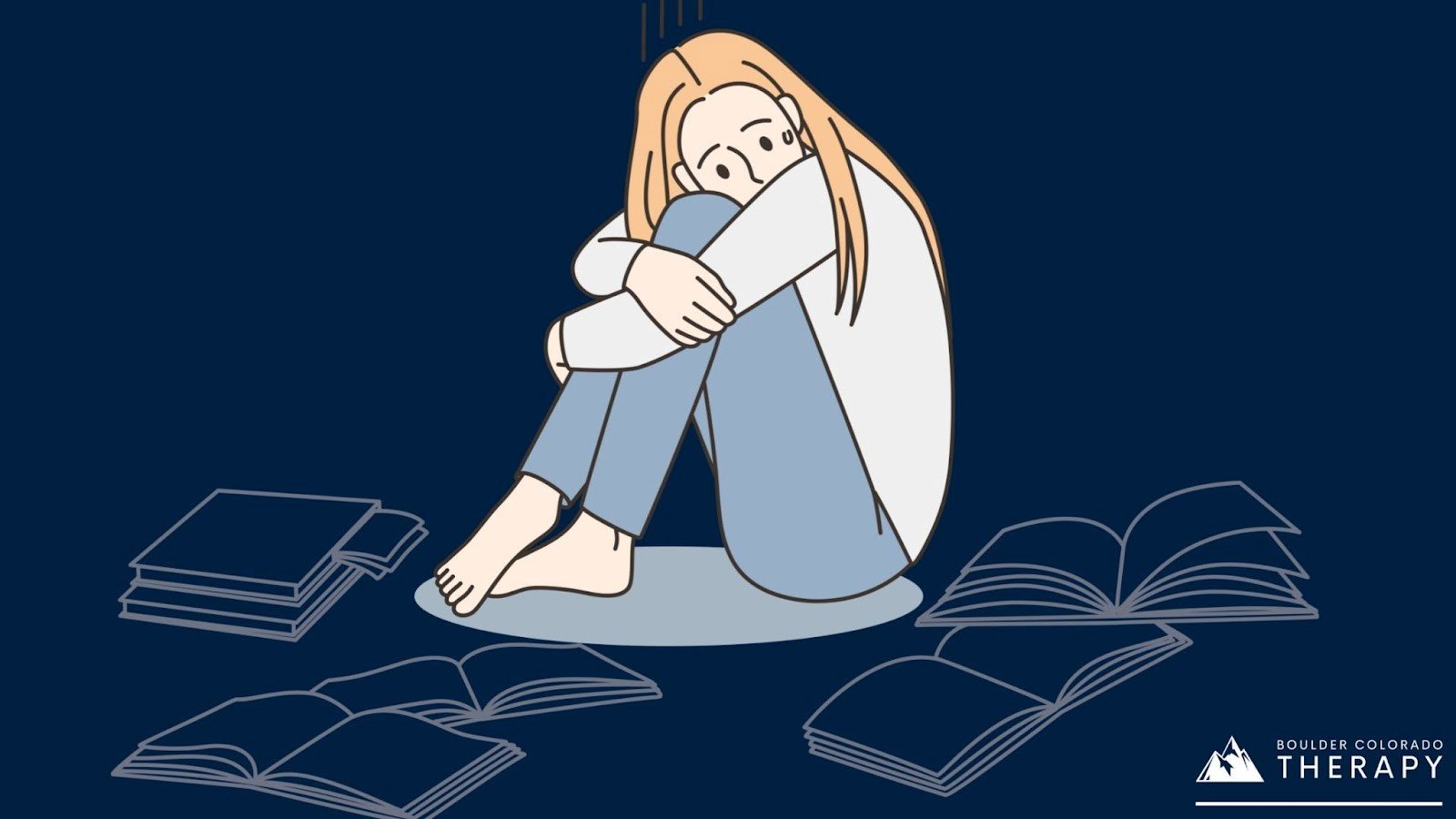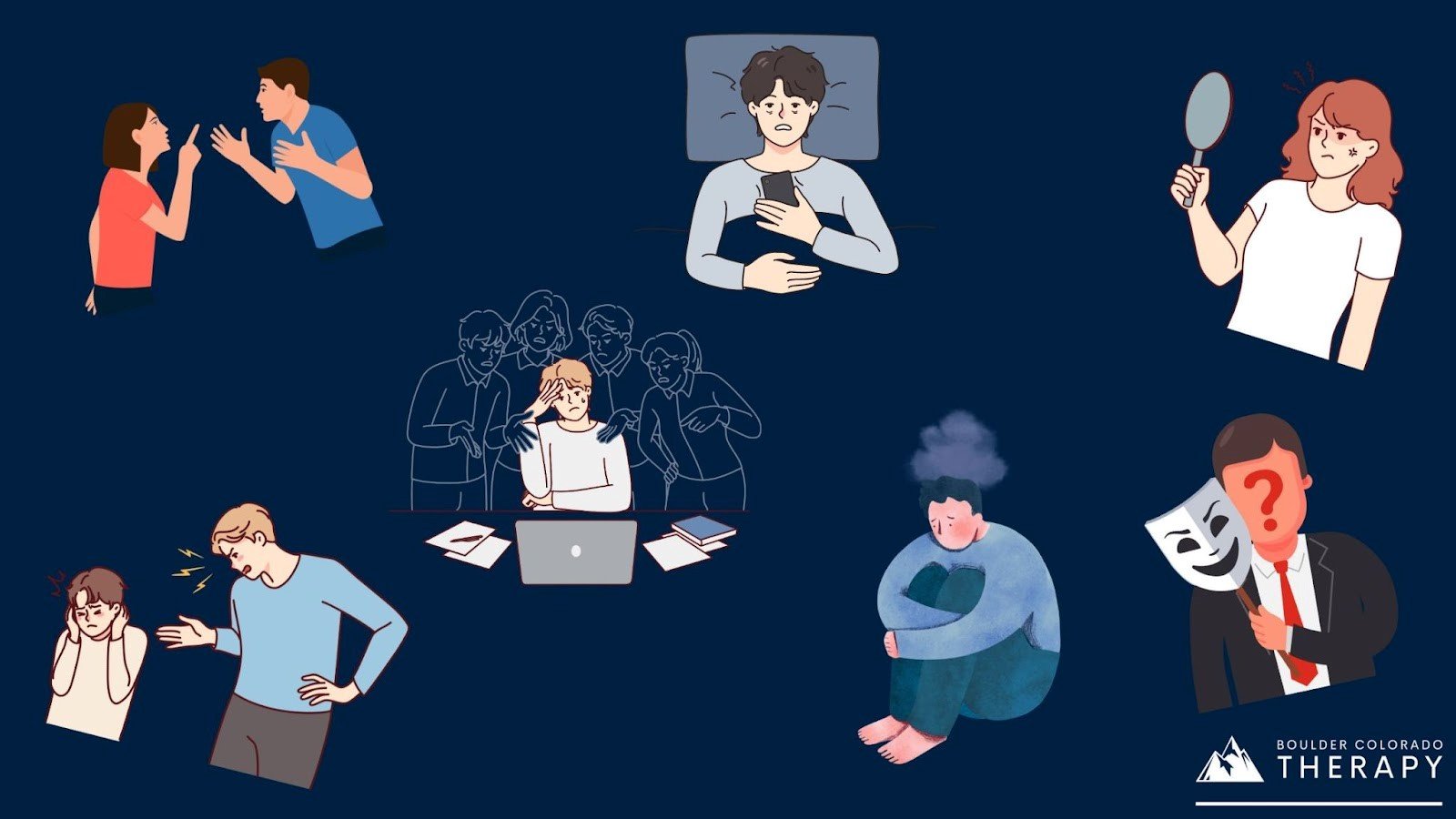Psychotherapy for Adolescents
The teenage years are a time of significant growth and transformation. As adolescents navigate academic pressures, social challenges, and emotional ups and downs, it’s normal for them to feel overwhelmed at times. This stage of life brings rapid physical, emotional, and cognitive development, which can lead to shifts in identity, relationships, and self-understanding.
At Boulder Colorado Therapy, we’re here to help teens build resilience, develop healthy coping skills, and discover their inner strengths. Our experienced team creates a safe, nonjudgmental space where teens can express their thoughts and feelings, work through challenges, and gain tools for self-discovery and emotional well-being.
Confidence and self-esteem play a key role in overcoming negative thought patterns and embracing personal growth. Through psychotherapy, we help teens strengthen these foundations, empowering them to face life’s challenges with courage and clarity.
How to Know If Your Teen Needs Psychotherapy
Are you uncertain about the necessity of therapy for your teen? As a parent, understanding your teen’s emotional and mental health needs is crucial to helping them navigate challenges and avoid potential risks. While some teens may manage stress and emotions effectively, others might need extra support to cope with overwhelming thoughts and feelings.
Here are some common signs that your teen might benefit from therapy:
Academic difficulties: A noticeable drop in grades, trouble focusing, or a lack of motivation for schoolwork
Persistent anxiety: Trouble sleeping, constant worry, or physical symptoms like headaches and stomachaches tied to stress
Mood changes: Frequent irritability, sadness, or mood swings
Loss of interest: Withdrawing from activities they used to love or overthinking daily situations
Disrupted routines: Significant changes in sleep patterns, appetite, or energy levels
Social struggles: Pulling away from friends or finding it hard to maintain healthy relationships
Concerning thoughts or behaviors: Expressions of low self-esteem, self-harm, or suicidal thoughts
Substance use: Using drugs or alcohol as a way to cope with emotions
If you’ve noticed any of these behaviors, seeking professional psychotherapy can make a meaningful difference. Therapy provides a safe and supportive environment where teens can process their emotions, learn healthy coping skills, and build resilience for the future.
What Causes Anxiety, Depression, and Negative Thoughts Among Adolescents?
Adolescence is a time of significant growth and change, but it can also bring stress and confusion. At Boulder Colorado Therapy, we work with families to understand the root causes of anxiety, depression, and negative thoughts in teens. Some key factors include:
Peer Relationships: Struggles with friends or feelings of isolation can deeply affect a teen’s emotional state, leading to anxiety or depression.
Body Image: Teens experience rapid physical changes that, when combined with societal expectations, can lead to anxiety about appearance.
Social Media: The constant search for validation through likes and comments can leave teens feeling inferior, especially when feedback is negative.
Parenting Styles: Teens can subconsciously internalize parental messages, which may unintentionally foster feelings of inadequacy, self-doubt, or self-blame. It's important to recognize that not all parenting styles resonate equally with every child, highlighting the need for flexibility and attunement in parenting approaches. Understanding this diversity helps create a supportive environment tailored to the unique temperament and developmental needs of each adolescent.
Academic Pressure: The intense pressure to get good grades or succeed in school exerts pressure on adolescents. This leads to stress, low mood, negative thoughts of facing failure, and anxiety among teens, affecting their overall psychological well-being.
Identity and Peer Pressure: Identity formation and Self-discovery are the cornerstones of adolescence.As teens try to define who they are, the pressure to fit in or stand out can create confusion and anxiety.
Family History: Genetics can play a role in mental health, making some teens more vulnerable to depression or anxiety, especially during stressful life situations.
By understanding these underlying causes, we work together with teens and their families to build resilience and create strategies for navigating these challenges.
What are the Common Symptoms of Anxiety and Depression Among Adolescents?
At Boulder Colorado Therapy, we understand that adolescence is a time of profound change and challenges. Identifying when a teen may need extra support is crucial for their well-being.
Boulder Colorado Therapy has explored the common symptoms that might indicate your teen needs extra support:
At Boulder Colorado Therapy, we understand that adolescence is a time of profound change and challenges. Identifying when a teen may need extra support is crucial for their well-being.
Loss of Interest: A noticeable withdrawal from hobbies and activities they once loved may indicate the onset of depression.
Social Withdrawal: Teens avoiding social interaction might be using isolation as a coping mechanism for overwhelming emotions.
Persistent Worry: Constant fear of failure and apprehension about the future are common indicators of anxiety.
Mood Swings and Irritability: Heightened irritability over minor stressors can signify emotional distress.
Difficulty Focusing: Struggling to concentrate or complete tasks might stem from underlying self-esteem issues or negative thought patterns.
Physical Symptoms: Recurring unexplained headaches, stomachaches, or appetite changes often have emotional roots.
Sleep Disruptions: Insomnia or altered sleep patterns can signal anxiety or depression.
Our team of compassionate, evidence-based professionals helps teens and their families address these challenges with warmth, expertise, and tailored support to foster long-term resilience and growth.
What Will be the Strategy of Psychotherapy at Boulder Colorado Therapy?
Collaboration, open communication, feedback from clients, and an all-encompassing well-being emotional state are the key aims of our psychotherapy sessions at Boulder Colorado Therapy. Our well-versed therapists rely on targeted interventions to develop coping mechanisms, unpack emotions, and empower teens to manage their mental health.
Folwing are the fundamental stages of our psychotherapy sessions:
Evaluation and Goal Setting - Assessment or evaluation of the problem refers to the initial stage of our psychotherapy sessions that involves collaboratively setting goals for therapy.
Tailoring - Based on clients’ feedback on the ongoing treatment procedure, our therapists make important adjustments to meet their unique needs, ensuring a comfortable and effective experience.
Partnership - Therapy is incomplete without collaboration. The therapists and professional counselors will work together alongside your teen, providing them with the opportunity to share their inner thoughts and guidance to develop healthy coping mechanisms.
Assessment and Conclusion - Through consistent monitoring of therapeutic techniques, we ensure continual progress tracking. Upon achieving the goals, our therapists conclude the sessions, providing clients with comprehensive support strategies.
Is there any Fast Remedy for Anxiety Among Teens?
Although fast remedies or quick solutions may offer temporary relief, they are not effective in the long run. Mindfulness techniques and deep breathing exercises generally provide short-term comfort but psychotherapy is the ultimate solution for lasting resolutions. This addresses the root causes of anxiety and equips teens with tools to build resilience and manage their emotions effectively. At Boulder Colorado Therapy, we focus on empowering adolescents to cultivate lasting well-being through evidence-based methods, fostering growth that endures beyond temporary remedies
What is the Duration of the Therapy? What if it Does not Work?
The length of therapy varies depending on individual needs, the severity of concerns, and personal goals. Some teens may thrive with short-term sessions, while others benefit from longer-term support. At Boulder Colorado Therapy, we prioritize a collaborative approach, regularly assessing progress with clients and tailoring interventions to ensure alignment with their needs. If challenges arise or progress feels slow, we adapt our strategies, fostering open communication and exploring new approaches to help teens find meaningful growth and healing.
What Other Therapies Do You Offer for Adolescents Facing Anxiety and Depression?
At Boulder Colorado Therapy, we provide a diverse range of therapeutic modalities tailored to empower teens in navigating life’s challenges effectively. Beyond traditional psychotherapy, our approaches integrate other evidence-based methods like mindfulness practices, cognitive-behavioral techniques, and holistic interventions. Together, we craft a supportive, personalized plan to meet their unique needs and foster growth.
Cognitive Behavioral Therapy (CBT): CBT helps address negative thoughts that lead to anxiety, assisting teens in learning to reframe negative anxious thoughts with more realistic coping mechanisms.
Eye Movement Desensitization and Reprocessing Therapy (EMDR): EMDR sheds light on the effectiveness of deep relaxation techniques to help people dive into their subconscious to identify the root causes of anxiety associated with past traumatic experiences.
Dialectical Behavioral Therapy (DBT): DBT focuses mainly on the techniques of distress tolerance, emotional regulation, interpersonal effectiveness, and mindfulness to equip adolescents with significant skills to manage strong emotions and relationship difficulties effectively.
Acceptance and Commitment Therapy (ACT): ACT is effective in reducing self-blaming attitudes, and helping youngsters accept difficult thoughts and feelings without judgment. Through this technique, they learn to observe their thoughts and emotions while developing healthy coping mechanisms to move forward with their values.
Mindfulness-Based Therapy (MBT): The team of experienced professionals will help teens cultivate present-moment awareness, leveraging the power of relaxation through breathing exercises and meditation. This allows them to navigate the intricacies of anxiety and stress by focusing on the present moment.







